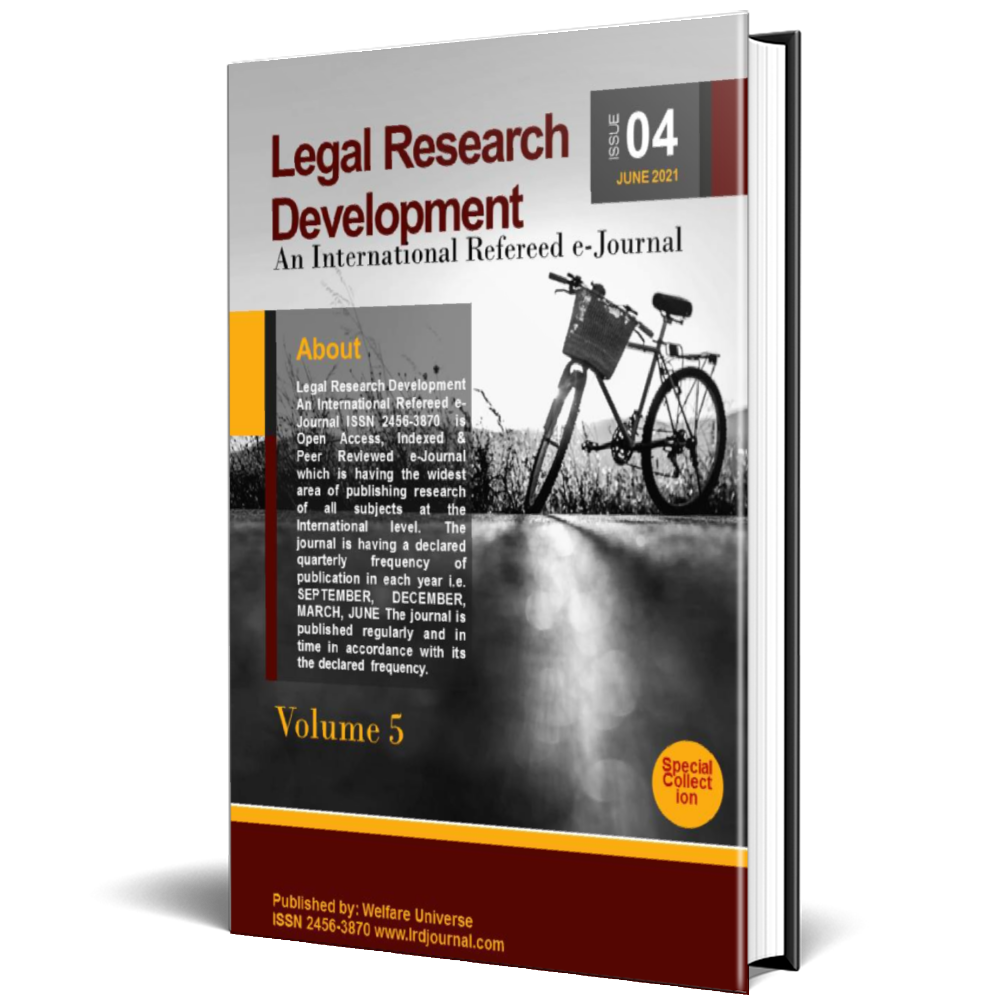Election Laws and Electoral Reforms in India and U.K.
DOI:
https://doi.org/10.53724/lrd/v8n4.8Keywords:
Model Code of conduct (MCC), Representation of the People Act (RPA), Electoral Offenses, Disqualification of Candidates, Campaign Finance Regulations, Votor Registration, Nomination Process, Electoral Bonds, Anti-Defection Law, Polling Booth ManagementAbstract
This paper examines the election laws and electoral reforms in India and the United Kingdom, highlighting their evolution, current frameworks, and ongoing challenges. India, the world's largest democracy, operates under a legal structure largely defined by the Representation of the People Act, 1951, and is overseen by the Election Commission of India. The Indian electoral system, based on the First-Past-The-Post (FPTP) model, has undergone significant reforms to address issues of transparency, voter fraud, and campaign finance, including the introduction of electronic voting machines (EVMs) and Voter Verifiable Paper Audit Trails (VVPATs).
In contrast, the United Kingdom's electoral system, rooted in centuries-old traditions, is regulated by laws such as the Representation of the People Acts and the Political Parties, Elections and Referendums Act, 2000. While the UK also employs the FPTP system, it faces criticism for not reflecting the proportionality of votes. Recent reforms in the UK have focused on improving voter registration, addressing electoral fraud, and debating alternative voting methods like the Single Transferable Vote (STV) to enhance democratic representation.
The study identifies both similarities and divergences in the electoral processes of these two democracies, emphasizing the impact of their respective legal frameworks on electoral integrity and democratic participation. It also explores ongoing debates and proposed reforms aimed at enhancing the inclusiveness, fairness, and transparency of elections in both nations.
References
https://www.oneindia.com/2010/01/25/weneed-consensus-to-keep-criminals-out-of-politics-sayss.html retrieved on 31.07.2024
T.K. Tope, Constitutional Law of India, P.no.648 (Eastern Book Company, Lucknow- 1982).
G.L. Srivastava “Law of Indian Elections and Election Petitions, Vol 1, 3rd ed Eastern Book Company, Lucknow, 1969
Enid Lakeman “How Democracies Vote: Study of Electoral System” 2nd edition (1974) ISBN-10: 0571048420, ISBN-13: 978-0571048427 Faber & Faber; London, 1974 pp. 23-28
ibid at p.19
Peter Paterson “The Selectorate: The Case for Primary Elections in Britain” ASIN: B0006DAB7I, MacGibbon & Kee (January 1, 1967)
Supra note 3 at p.1
Hearnshaw, 'Democracy of The Crossways', Palala Press, London, Pg. No 17- 22.
https://www.legit.ng/1207669-advantages-democracy-military-rule-nigeria.html retrieved on 30.07.2024
https://www.history.com/topics/european-history/british-parliament retrieved on 28.07.2024
J.F.S. Ross, The Irish Election System, what it is and how it works, Pg. No-69, Pall Mall Press, London, First Published, 1959.
https://en.wikipedia.org/wiki/1967_Maharashtra_Legislative_Assembly_election retrieved on 31.07.2024
V S Rama Devi & S K Mendiratta, Dr. Nasim Zaidi, 'How India Votes, Election Laws, Practice and Procedure', Lexis Nexis, Edition, 2017.
https://www.idea.int/es/publications/catalogue/international-electoral-standards-guidelines-reviewing-legal- retrieved on 25.07.2024
T.E. Smith, O.B.E, B. Keith- Lucas, Elections in Developing Countries, Macmillan and Co Ltd, New York, 1960.
https://www.parliament.uk/about/how/elections-and-voting/general/ retrieved on 31.07.2024
https://www.electoralcommission.org.uk/ retrieved on 27.07.2024
The International IDEA Handbook 2014 International Institute for Democracy and Electoral Assistance https://www.idea.int/publications/catalogue/direct-democracy-international-idea-handbook retrieved on 31.07.2024
Dr. P. Rathnaswamy, Electoral Reforms: Law and Institutions of India and World, Book Well, New Delhi,2004.
Other work cited:
Election Law of India” by J.N. Pandey: This comprehensive text covers various aspects of election law in India, including recent reforms.
“India’s Living Constitution: Ideas, Practices, Controversies” by Subhash C. Kashyap: This book provides insights into the constitutional aspects of electoral reforms in India.
“Indian Election Law: An Analysis” by S.K. Mendiratta: A detailed analysis of election laws in India, this book is particularly valuable for understanding legal intricacies.
“Election Law Reforms in India: Issues and Challenges” by D.N. Ghoshal: This article explores key issues and challenges in the context of electoral law reforms.
“Money, Muscle and Elections: Criminality in the Indian Political System” by Jagdeep S. Chhokar: Chhokar’s work delves into the legal aspects of criminality and corruption in Indian elections.
“Electoral Reforms and Indian Democracy” by G. Mohan Gopal: This scholarly article discusses electoral reforms within the context of Indian democracy and constitutional principles.
“Electoral Reforms in India: Challenges and Prospects” by Anil Kumar Thakur: Thakur’s research paper provides a legal perspective on the challenges and prospects associated with electoral reforms.
“Legal Aspects of Elections in India” by M. S. Gill: An authoritative work by a former Chief Election Commissioner, this book provides insights into the legal dimensions of elections in India.
“The Election Commission and Administrative Autonomy” by V.S. Rama Devi: This book explores the legal and administrative facets of the Election Commission in India
Downloads
Published
How to Cite
Issue
Section
License
Copyright (c) 2024 Legal Research Development

This work is licensed under a Creative Commons Attribution-NonCommercial 4.0 International License.










